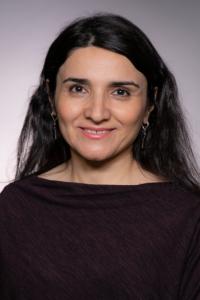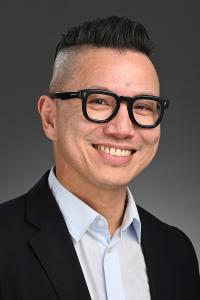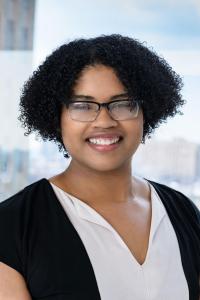Spotlight on Elizabeth Hay - Casting Professional
Patient Spotlight
As one of the few casting professionals who openly identifies as disabled, Elizabeth Hay is dedicated to amplifying the voices of underrepresented communities in media. Passionate about shifting perceptions around disability, she firmly believes in the talent of disabled artists and works to expand their representation beyond casting. An adult with cerebral palsy, Elizabeth brings a unique perspective to her work and is deeply connected to the Disabled and Hispanic communities.
We caught up with Elizabeth to find out how she is making sure people with disabilities are seen and authentically represented in film and media.
1. You've been an active member of New York’s casting community since 2017, how did you become a casting professional for artists with disabilities?
Danielle Pretsfelder Demchick (of DPD Casting) and I have always been dedicated allies to marginalized communities. Over time, Danielle recognized a significant need for authentic casting within underrepresented groups, particularly in the disability community.
Despite the fact that 1 in 4 Americans has a disability, their presence in media remains disproportionately low. The pathways into the industry are not the same for disabled actors—it’s far less common for them to have agents or managers. But that doesn’t mean they aren’t professional actors; it simply means they haven’t been afforded the same opportunities.
Danielle also understood that true representation requires authentic leadership from within the community. Amplifying voices is most effective when led by those with lived experience. That’s where I came in.
With years of experience casting major productions and as someone who identifies as part of the disabled community, I knew we shared a vision for transforming the media landscape. Together, we are committed to shifting industry standards and ensuring disabled artists are seen, valued, and given the opportunities they deserve.
2. How has your work changed that?
Our work is already opening doors for disabled artists. We prioritize authentic casting, going beyond traditional talent pipelines to actively seek performers through disability organizations, online networks, and grassroots outreach.
Beyond casting, we ensure productions provide necessary accommodations, consulting with experts to guarantee accessibility on and off set. We also advocate for industry-wide change, educating decision-makers on the importance of disability representation as a core part of storytelling.
While there’s still work to do, we’re proud to be driving lasting change and ensuring disabled artists are seen, valued, and given the opportunities they deserve.
3. Do you only exclusively work with actors with disabilities?
The short answer is no—we cast all types of projects. While we specialize in outlier casting, we handle all principal roles and work with major agents, networks, and studios like any other casting office. We’re just deeply committed to ensuring marginalized performers, including disabled actors, have equitable opportunities.
One of our core beliefs is that performers with disabilities shouldn’t be limited to roles that explicitly call for a disability. If a character isn’t specifically written as disabled, why not consider an actor who uses a wheelchair? Why shouldn’t the romantic lead have a disability? Disabled people live full, dynamic lives—they fall in love, go to school, pursue careers, and exist in every facet of society. Their presence in media should reflect that reality. Authentic casting isn’t about checking a box—it’s about expanding perspectives and making space for all kinds of talent.
4. We don't see many films with people with disabilities in the media. Why do you think that is?
Hollywood often excludes disabled people unless their stories focus on struggle or inspiration. Disability is frequently used as an awards-bait trope, with non-disabled actors winning praise for imitating disability—like Daniel Day-Lewis in My Left Foot or Leonardo DiCaprio in What’s Eating Gilbert Grape—rather than representing it authentically.
Another barrier is the myth that accessibility is too costly. In reality, inclusive sets benefit everyone and create more efficient, welcoming productions.
Disability is part of everyday life, not a rarity or plot device. Until Hollywood embraces that, true representation won’t happen—but that’s exactly why we do this work.
5. You are working on an exciting project related to cerebral palsy, can you share some details?
We are working on, Essay #2, a powerful coming-of-age drama about twin sisters—one of whom has cerebral palsy. Written by University of Wisconsin professor Jackson Tobin, the film is based on his acclaimed short story, inspired by personal family experiences.
The story follows Annette, a brilliant, creative overachiever with CP, and her free-spirited twin, Charlie, who struggles to find her own identity. As they prepare for college, they navigate family, ambition, and the fears of growing apart.
After an extensive international search, we cast Niamh Moriarty, an emerging Irish actress with CP. And then the other people, I can't quite disclose yet, but we have a really, really great cast set up, and it's authentically cast.
The film will be directed by John Carlucci and Brandon LaGanke, known for their bold, authentic storytelling. Right now, we’re in pre-production and seeking more funding, with production hopefully starting this summer. When the project is finished, the goal is dual distribution—both theatrical and streaming—but we will see.
6. Finally, how does one become an actor? Share some tips with us!
For people with disabilities, pursue as much training as possible. Your path may not be linear—at least not yet—but there are fantastic schools actively seeking disabled talent, such as Pace, Yale, and Shenandoah Conservatory. Explore BFA or MFA programs if that’s an option for you. If formal schooling isn’t feasible right now, immerse yourself in community theater. Visit your public library and read every script you can find. Gather friends to film a reading or put on a scrappy production. Study acting methods, read every book you can, and put those techniques into practice. Engage in anything and everything creative—trust me, it will pay off. Chances are, someone like me will find it.



